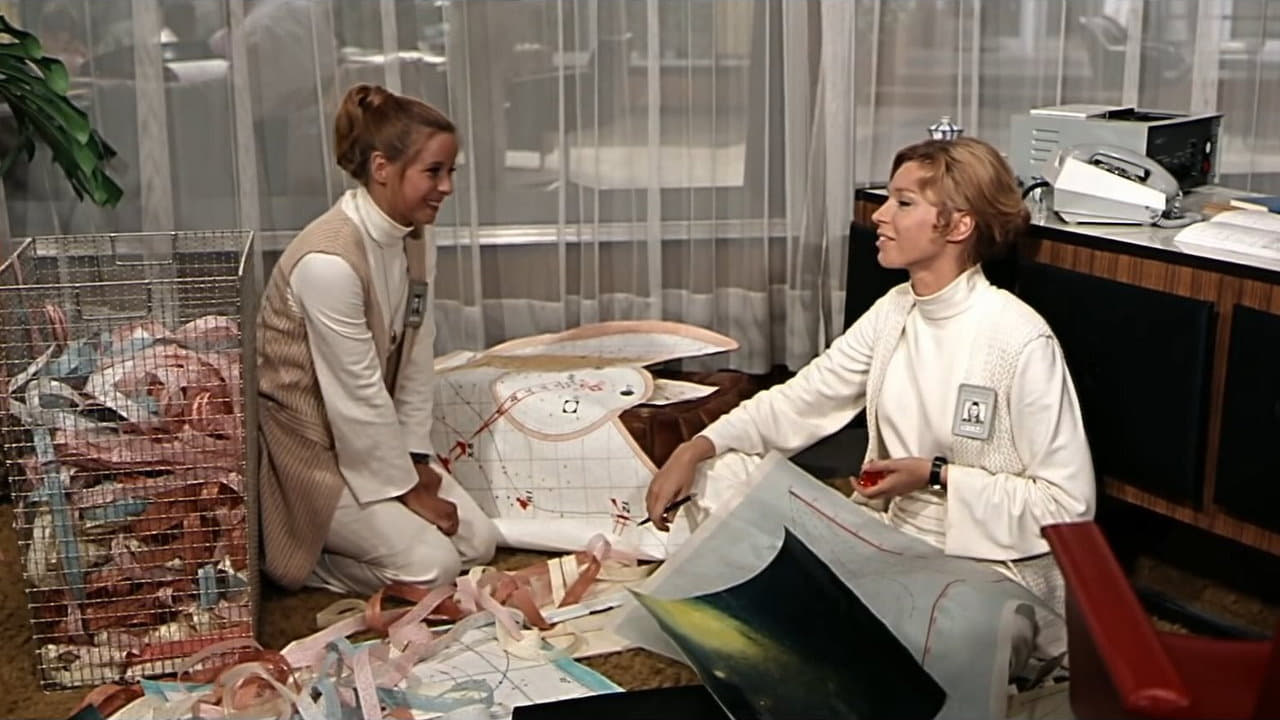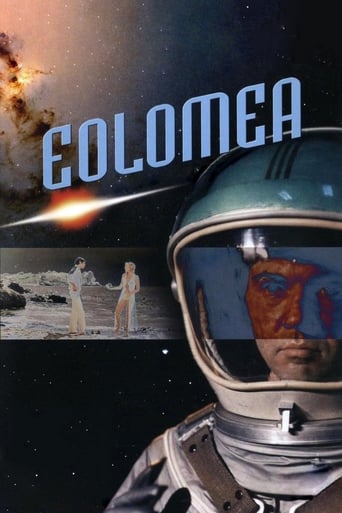

"Eolomea" is an 80-minute live action film from 1972, so it will have its 45th anniversary next year. The director is Herrmann Zschoche and he was among the most known East German filmmakers and he is still alive today in his early 80s. The writer who adapted the original work by Angel Vagenshtain was Willi Brückner. There are actually a handful GDR science-fiction films that have become more known than most of the other (non-war themed) films from that country and it was a bit of a popular genre fitting in with the time back then as it was the age when space was explored. The cast here is a colourful mixture of actors from all kinds of countries, such as the GDR, Switzerland, the Netherlands, Bulgaria and the Soviet Union, maybe even more.This film is about a woman (Cox Habbema) examining the disappearance of several space ships and other mysterious developments surrounding space stations and astronauts. And in the center of it all, apparently knowing much more than he admits, is Prof. Oli Tal, played by Rolf Hoppe, one of the most known GDR actors and he is also still alive today way into his 80s. I thought his scenes with Habbema were probably the highlight of the film and really the only moments where I genuinely cared somewhat about the action and the characters. Most of the other supporting characters felt entirely bland and uninteresting to me sadly. Oh yeah, this is a color film which is not to be taken for granted for GDR films of the early 1970s. All in all, I give this one a thumbs-down, but I also may be a bit biased as I have never been too big on SciFi. Only worth checking out for huge lovers of this genre.
... View MoreI've got to begin this by saying I enjoy Eastern European sci-fi. I really loved SOLARIS(very internal; moody) and even less complex pieces like PLANETA BUR (Planet of Storms). SILENT STAR also comes to mind for its wildly imaginative extraterrestrial depictions. This film, EOLOMEA is a movie nestled somewhere between SOLARIS and SPACE:1999. The characters have some complexity and tend to brood a bit( common in '70s sci-fi in general) and the sets look very real and 'lived-in.' While the effects and miniature spacecraft remind me of Gerry Anderson efforts. The story is pretty simple; cosmonauts are stealing spacecraft on a quest for a mathematically plotted Utopian (possibly mythic) world of EOLOMEA. Sounds an awful lot like STAR TREK 5! But it's not THAT bad(what is?!) Space 'cab driver' Dan is bored with routine duty on a lunar base, misses the Earth (for awhile, anyway!) and has lost his 'joie de vive' (and has gained a bitter, sarcastic anti-hero persona in its place). He and his older, former space-pioneer co-pilot vent to each other(the pioneer's son is on one of the missing ships), providing some good character business. Anyway, the seemingly lost spacecraft lead to a temporary ban on all interplanetary flight, and an earth-based (and truly creepy) scientist seems to know a lot more than he is willing to share (he's vaguely reminiscent of 'Ash' in ALIEN, though not as sinister). Dan ignores the ban, of course, and eventually after boarding a seemingly abandoned space station, solves the mystery of the 'missing' spaceships and their rebellious crews. And, since their first choice for navigator (who may not have accurately plotted Eolomea's position anyway) rather conveniently croaks, Dan agrees to take his place. Thus the film ends as the quest for Eolomea and a possible extraterrestrial civilization begins. Nice, ambiguous ending. Not too many of those these days! The film has nice bits throughout; an obsolete broken-down robot, some brief psychedelic images scattered throughout, and nice pieces of music here and there. Most of the characters come off as dull, but Dan really stands out. Sort of a scruffy, Eurotrash combination of Han Solo and Jack Nicholson! While not as profound as SOLARIS or as adventurous as PLANETA BUR, EOLOMEA is an interesting piece of sci-fi from a somewhat oppressive period in Eastern European history. And despite the limits of speech imposed on many films of that time/place, it says much about dissent and the quest to risk one's life in pursuit of something better. Not a great film by any stretch, but an interesting, different mindset of science fiction that we don't often see here in the western world. Worth a look only for those patient with less 'action-packed' sci-fi.
... View MoreEolomea is a trippy, serious-minded, interesting, Utopian, richly-colored 1970s spaced-out timepiece of a film. But Kubrick's "2001: A Space Odyssey" it's not. Indeed, Tarkovsky's "Solaris" it's not. Oh, this East German film strains mightily to compete with either of these epics, but the slightly threadbare production values, the "challenged" model work (apparently shot on 70 mm film), the sometimes circular plot, and strange (incomplete?) visual and sound edits ultimately makes for an inferior product. If you are a lover of 70's era sci-fi, this one has got to be on your list--in one sense it is a real find. Me? I'll gladly put it on my bookshelf right next to "Zardoz," "Soylent Green," "Zero Population Growth," and "Idaho Transfer." (Unlike most of those films, though, "Eolomea" is Utopian in nature instead of dystopian.) The fact that this DEFA film is now available on DVD is a triumph, really. You should snap it up. The widescreen transfer looks great, the colors are nice, the images are carefully crafted.But the interior of the ships and space stations--though they tend toward realism rather than the fantastic--look tiny and unimpressive (the budget is showing), the robot hardware is quaint (and silly, on purpose), the spacesuits look like pajamas...you get the picture (because you've seen this sort of thing before). At times, the visuals of this film seem stuck 20 years in the past from when it was made; at other times though, it tries very hard to excel (especially in the 70's loungey space rock score and the trippy use of those oil-n-water color gel slides that spread out across the screen in a variety of colors and shapes to represent the liquid and alien "unknown" of space).My expectations for this film were probably way too high--I thought I was going to be discovering another "Solaris" honestly. But the plot is tension-less and the characters are, ultimately, wooden. (And that's a problem when a film relies mainly on the interaction of characters to push the action along.) If the writers and directors were making a thrilling space adventure, they failed miserably. The story surrounds a group of some 160 cosmonaut-scientists who go off in search of the mythological planet of Eolomea. Oh, sorry, I just gave the ending away. But I haven't really given away very much. Everything that comes before the unimpressive take-off at the end is two hours of bickering about whether or not they should go. Don't get me wrong; there's a whole helluva lot of talking in "Solaris" too. I love a talky, inventive, idea-oriented sci-fi film as much as the next guy. But this didn't even really trade in interesting ideas. The plot: "Should we go look for this planet or not? Yes? No? Why? Why not? OK, let's go. The End." But instead of getting depressed thinking I've seen every cool 70s sci-fi flick that exists, along comes "Eolomea" just in time--with its feet planted firmly in the future and its style planted firmly in 1972. For that fact alone, I am in debt.
... View MoreScience fiction made in East Europe usually has different perspectives of life as Western science fiction. This is one example.Not about technology or the future of our society, not even about the search for extra-terrestrial intelligence (that it claims to be about), but about humans, their character traits, and their quest for the final frontier.Accordingly the visual effects by Kurt Marks and Boris Trawkin, though awarded the Grand Prix of the UNIATEC, suffer in comparison with other fx-heavy movies made about the same time, like Academy Award-winning The Poseidon Adventure or Douglas Trumbull-directed Silent Running.Still it creates a future that could happen any time, showing technology only in outer-space, and the stations in space and on asteroids look pretty much like good old MIR, the Russian space-station.And yet it is rewarding for those who love the human desire for knowledge...This was the third science fiction movie of the legendary DEFA studio and the first one to be based on an original concept (by Bulgarian Angel Vagenstein), starring Dutch Cox Habbema, Ivan Andonov (a director in his native Bulgaria) and Russian actor Vsevolod Sanayev (who died January in 1996), and German actors Rolf Hoppe and Wolfgang Greese.
... View More